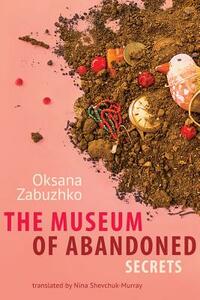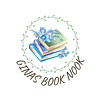You need to sign in or sign up before continuing.
Take a photo of a barcode or cover
With all that's going on in Ukraine right now I wanted to read something that would help me understand the conflict. This novel was on a list created for that purpose. It was really long (760 p.), really wonderful, and one I can’t get out of my head. The plot revolves around 3 women: a contemporary tv journalist, Daryna, who becomes obsessed with finding out the story of a striking woman in a photo of 5 partisans taken during WWII; Vlada, Daryna’s artist friend who dies suspiciously in a car accident; and Olena, the woman in the photo, a member of the Ukrainian Insurgent Army who was killed in 1947 by Stalin’s secret police.
But it’s also about this:
That’s important because early on in the novel Daryna finds a note -- actually just a word -- in the margin of one of her father’s books that appears to be the key to understanding him, a man whose long and seemingly pointless “struggle against the system” eventually cost his family any kind of normalcy and him his life. He dies a broken forgotten man in his mid 40’s after years spent defending himself against the Soviet authorities false claims ... and after enforced time in a psychiatric clinic with a falsified diagnosis. But then Daryna comes upon that page in one her father's books with an underlined phrase: “Hamlet’s hesitation to act decisively in sight of triumphing evilness” ... with this!!! handwritten in the margin.
I loved Zabuzhko's writing and, long as this novel was, it was truly a delight to be inside her head. When I hear news from Ukraine now it comes to me at a higher decibel because of the time spent with these characters. Really liked it.
But it’s also about this:
I have come to think that a person’s life is not so much, or rather is not just, the dramatically arched story with a handful of characters (parents, children, lovers, friends, and colleagues –anyone else?) that we pass on more or less in one piece to our descendants. It’s only from the outside that life looks like a narrative, or when viewed backwards through a pair of mental binoculars we put on when we have to fit ourselves into the small oculars of resumes, late-night kitchen confessions, and home-spun myths, trimming and shaping life into orderly eyefuls. When seen from the inside, life is an enormous, bottomless suitcase, stuffed with precisely such indeterminate bits and pieces, utterly useless for anyone other than its owner. A suitcase carried, irredeemably and forever, to the grave. Maybe a handful of odds and ends fall out along the way … so whenever I stumbled into one of those lost, disowned scraps I was filled with a vague but insistent shame of my inadequacy, as if this piece, this accidental survivor, contained the key – the lost secret code to the deep, subterranean core of the other person’s life – and now I have it, but I don’t know which door it unlocks or if such a door even exists. Pg. 20
That’s important because early on in the novel Daryna finds a note -- actually just a word -- in the margin of one of her father’s books that appears to be the key to understanding him, a man whose long and seemingly pointless “struggle against the system” eventually cost his family any kind of normalcy and him his life. He dies a broken forgotten man in his mid 40’s after years spent defending himself against the Soviet authorities false claims ... and after enforced time in a psychiatric clinic with a falsified diagnosis. But then Daryna comes upon that page in one her father's books with an underlined phrase: “Hamlet’s hesitation to act decisively in sight of triumphing evilness” ... with this!!! handwritten in the margin.
this!!!---a scribble in the margins, a bauble that slipped out of the suitcase---turned the binoculars for me. For an instant, as if a flash of lightning cut through the darkness, I saw a living soul and the strange thing was that it was the same father about whom I, against my best instincts, continued to feel ashamed ... to see him from the inside and recognize, in that flash, what it was that had driven him to the end, that had not permitted him to back off and make the single required concession that white was really black; his indomitable abhorrence of his own fear, the physiological mandate from his very healthy and apparently very proud soul ... to reject this fear that had been implanted in him against his will, like viral DNA ... I could be proud of him. Pg.32
I loved Zabuzhko's writing and, long as this novel was, it was truly a delight to be inside her head. When I hear news from Ukraine now it comes to me at a higher decibel because of the time spent with these characters. Really liked it.
challenging
informative
reflective
The Museum of Abandoned Secrets was a challenging read for me, especially when I was initially listening to the audiobook. It’s a lengthy book with a large cast of characters, including two who share a name, a complex plot with a dual timeline and some narrative techniques which require plenty of attention. Luckily I found a Kindle deal and was able to switch. Reading worked better for me than listening.
In the early 21st century we meet Daryna, a journalist. She has found an old photograph of Olena from the World War II era, is fascinated by it and wants to discover exactly who Olena was and what happened to her in order to make a documentary. Daryna’s friend Vlada is an artist. When she dies Daryna refuses to believe it is an accident. So she is effectively investigating two mysteries sixty years apart. Her investigations encompass much interesting Ukrainian history including famine in the 1930s, the Stalin era, the fight for independence, and the 2004 Orange Revolution.
Daryna is prone to a lot of stream of consciousness narrative, similar to that in Ducky’s Newburyport but broken up with more plot developments and other narrative techniques. One of these is the use of dreams. We learn much about Olena’s life through the dream of Adrian, one of her relatives who becomes Daryna’s lover. Both techniques place demands on the reader.
Thankfully these demands were rewarded. Not only did both timelines involve satisfying stories with strong women but I learned a lot of Ukrainian history along the way. I also particularly enjoyed tracking the theme of secrets, especially those that refuse to remain hidden, which runs through the novel and seeing all the different ways it presented.
A rewarding intellectual book from a country many of us (I’m sure it’s not just me) have not read a lot from.
In the early 21st century we meet Daryna, a journalist. She has found an old photograph of Olena from the World War II era, is fascinated by it and wants to discover exactly who Olena was and what happened to her in order to make a documentary. Daryna’s friend Vlada is an artist. When she dies Daryna refuses to believe it is an accident. So she is effectively investigating two mysteries sixty years apart. Her investigations encompass much interesting Ukrainian history including famine in the 1930s, the Stalin era, the fight for independence, and the 2004 Orange Revolution.
Daryna is prone to a lot of stream of consciousness narrative, similar to that in Ducky’s Newburyport but broken up with more plot developments and other narrative techniques. One of these is the use of dreams. We learn much about Olena’s life through the dream of Adrian, one of her relatives who becomes Daryna’s lover. Both techniques place demands on the reader.
Thankfully these demands were rewarded. Not only did both timelines involve satisfying stories with strong women but I learned a lot of Ukrainian history along the way. I also particularly enjoyed tracking the theme of secrets, especially those that refuse to remain hidden, which runs through the novel and seeing all the different ways it presented.
A rewarding intellectual book from a country many of us (I’m sure it’s not just me) have not read a lot from.
I wasn't sure that I was getting into the story at first, but the writing was so very beautiful to me. I have been trying to think of the best description, and my guess is lyrical. I would compare it to listening to music or drifting on a river, almost lulling in a way. Not boring, but stunningly beautiful.
When I got into the story it revealed its own charm. I didn't want to put the book down as the story and its mystery unraveled.
The historical basis of the book, was very well done. It brought up as many questions to me as it seemed to answer. It blended the past and present in an unique and interesting way.
It feels like I have so much to say about this book, and yet, I am not sure words can quite cover it. Which is possibly one of the things I like most in any book. What a profound thought, books are made of words, so how can they escape them....
When I got into the story it revealed its own charm. I didn't want to put the book down as the story and its mystery unraveled.
The historical basis of the book, was very well done. It brought up as many questions to me as it seemed to answer. It blended the past and present in an unique and interesting way.
It feels like I have so much to say about this book, and yet, I am not sure words can quite cover it. Which is possibly one of the things I like most in any book. What a profound thought, books are made of words, so how can they escape them....
There paragraphs in this book that is so stellar and so fantastic that all the boredom the same book induced, was kicked to the curb. A look into Ukrainian history through the eyes of two protagonists separated by time and eras where the current politics was taking a drastic turn in international arena. The presence of the two women is strong every time they are on page but the fire sizzles out when the author ventures slightly out of this comforting boundary. The story expands and contracts without changing much of the fundamental plot and as a reader it messes up the focus. We, as readers are invested in knowing the woman from a time gone by but the jarring plot disturbs this focus thus potentially, at least in my case, lose interest in anything other than what I really want.
I will go ahead with this presumption that its a historical fiction thing where there are many strong players (along with the historical context itself) along with the protagonist the story is invested it, and maybe this is why historical fiction doesn't always grab my attention.
Probably this is a personal thing, I preferred if the size of the book was reduced to one quarter. I would have enjoyed it more.
I will go ahead with this presumption that its a historical fiction thing where there are many strong players (along with the historical context itself) along with the protagonist the story is invested it, and maybe this is why historical fiction doesn't always grab my attention.
Probably this is a personal thing, I preferred if the size of the book was reduced to one quarter. I would have enjoyed it more.



